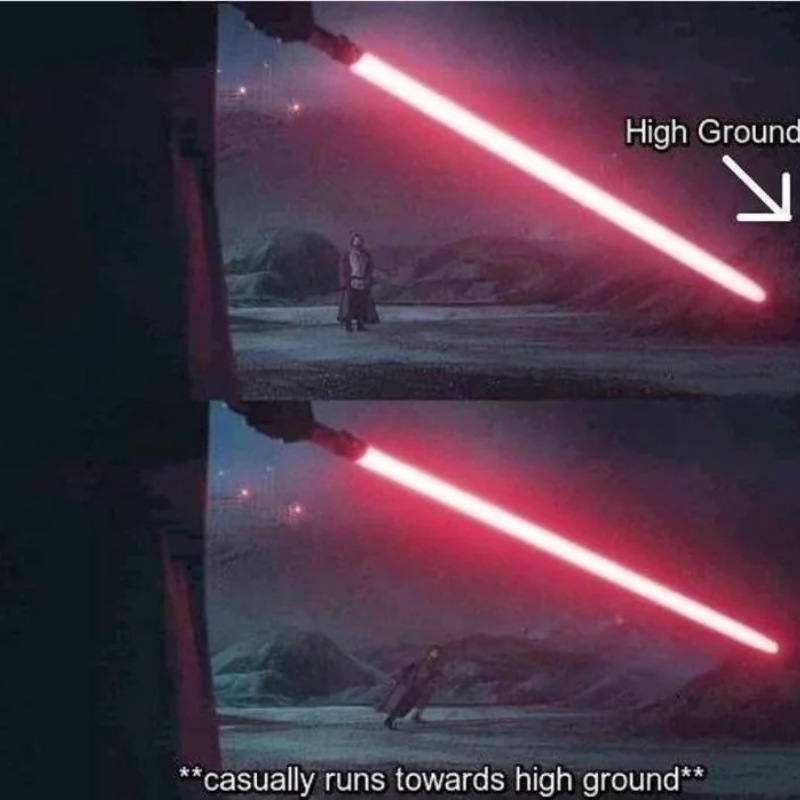Obi-Wan Kenobi is one of the most beloved Jedi in the Star Wars universe, known for his wisdom, skill, and a certain knack for winning battles when he gets the high ground.
But what makes the high ground so special for Obi-Wan? Let’s dive into this iconic moment and understand why Obi-Wan was unbeatable once he claimed that elevated position.
The Iconic Duel on Mustafar
Let’s set the scene: Anakin Skywalker, now Darth Vader, and Obi-Wan Kenobi are engaged in an epic lightsaber duel on the volcanic planet of Mustafar.
Amidst the heat and lava, the fight is intense and evenly matched. But then, Obi-Wan jumps to a higher position on a slope and confidently declares, “It’s over, Anakin. I have the high ground.”
Anakin, driven by his arrogance and anger, ignores the warning and leaps towards Obi-Wan, only to be swiftly defeated.
The High Ground Matters
1. Strategic Advantage
The high ground gives a fighter a strategic advantage. From an elevated position, Obi-Wan could see Anakin’s movements more clearly and had better control over his own strikes.
This made it easier for Obi-Wan to defend himself and anticipate Anakin’s attacks.
2. Defensive Position
Being on higher ground makes it harder for the opponent to land an effective blow.
Anakin had to attack from below, which is a more difficult and less powerful angle.
Meanwhile, Obi-Wan could easily counter any move Anakin made.
3. Psychological Edge
Obi-Wan’s confidence in declaring his advantage was a psychological blow to Anakin.
It showed that Obi-Wan was in control of the situation, which likely made Anakin even more reckless and desperate.
This overconfidence and anger led to Anakin making a fatal mistake.
4. Force Management
If Anakin wanted to attack Obi-Wan, he would have to use a Force jump to reach him while simultaneously using the Force to fight with the lightsaber.
This dual use of the Force would cost Anakin more energy and put him at a significant disadvantage.
In contrast, Obi-Wan, already in a ready position, could focus all his energy on defense and counter-attacks, making it almost impossible for Anakin to win.
Curious About the High Ground in Real Life?
If you’re wondering whether the high ground really provides such a big advantage in real-life battles, check out our article 6 Reasons Why the High Ground is a Battle Winner.
You’ll find out how this strategy works in actual combat situations and why it’s been a crucial element in warfare throughout history.
1. Obi-Wan’s Lightsaber Combat Form
Obi-Wan Kenobi’s mastery of lightsaber combat played a crucial role in his ability to utilize the high ground effectively. He was a practitioner of Form III, also known as Soresu.
This form focuses on defensive techniques, allowing the user to outlast their opponent by conserving energy and maintaining a solid defense.
Obi-Wan’s proficiency in Soresu meant that he could effectively block and parry attacks, waiting for the perfect moment to strike.
His calm and patient approach made him a formidable opponent, especially when combined with the strategic advantage of the high ground.
2. Obi-Wan’s Tactical Brilliance
Obi-Wan’s use of the high ground is a testament to his tactical brilliance and experience.
Throughout the Star Wars saga, he demonstrates an ability to think on his feet and use his environment to his advantage.
Whether it’s outsmarting enemies or making a daring escape, Obi-Wan always finds a way to turn the tide in his favor.
Why Anakin’s Confidence Cost Him
Obi-Wan’s duel with Darth Maul is another legendary battle that highlights his tactical brilliance. On Naboo, after Qui-Gon Jinn was mortally wounded, Obi-Wan found himself hanging from a ledge with Maul holding the high ground.
Despite this disadvantage, Obi-Wan used the element of surprise by leaping up and grabbing Qui-Gon Jinn’s lightsaber, striking Maul down.
This victory was due to Maul’s recklessness and Obi-Wan’s quick thinking, rather than a prolonged defensive strategy.
Anakin had studied Obi-Wan’s fight with Maul carefully and believed he could overcome the high ground advantage.
He was confident that his power and skills would allow him to defeat Obi-Wan, just as Obi-Wan had defeated Maul.
However, the key difference was Obi-Wan’s strategic use of the high ground on Mustafar, combined with his mastery of Soresu and his deep understanding of Anakin’s fighting style.
Unlike Maul, Obi-Wan was not caught off guard or reckless. He was always ready to fight and used his defensive skills to outlast Anakin.
Anakin’s arrogance and anger clouded his judgment, leading him to make a reckless move that ultimately cost him dearly.
Lessons for Us All
While we might not be dueling with lightsabers or fighting on lava planets, there’s a lesson to be learned from Obi-Wan’s high ground strategy: always look for ways to gain an advantage, stay calm under pressure, and never underestimate the power of a well-timed jump to a higher spot!
The Funny Side
We all love a good Star Wars meme, and the “high ground” scene has certainly provided plenty of material.
Fans joke that Obi-Wan becomes invincible as soon as he gets the high ground, turning it into a kind of Jedi superpower.
Imagine Obi-Wan in everyday situations: “Sorry, can’t beat me at checkers, I’ve got the high ground!”

Conclusion
Obi-Wan Kenobi’s unbeatable status once he got the high ground is a mix of strategic brilliance, defensive superiority, and psychological edge.
It’s a moment that has become iconic in Star Wars lore and a favorite among fans for its drama and the memes it has inspired.
So next time you’re in a tricky situation, remember Obi-Wan’s wise words: “It’s over. I have the high ground!” May the Force be with you!

